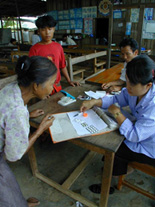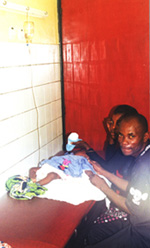|
|
|||||
|
|
On
This Page: See Also: Guidelines for Clinicians (including a treatment table) Recently, CDC has updated the standard CDC malaria diagnosis and treatment guidelines, which were published in an article in JAMA May 23rd and can be accessed for free online: view JAMA article. Information for The General Public
Malaria can be a severe, potentially fatal disease (especially when caused by Plasmodium falciparum) and treatment should be initiated as soon as possible. In endemic areas, the World Health Organization recommends that treatment be started within 24 hours after the first symptoms appear. Treatment of patients with uncomplicated malaria can be conducted on an ambulatory basis (without hospitalization) but patients with severe malaria should be hospitalized if possible. In areas where malaria is not endemic, all patients with malaria (uncomplicated or severe) should be kept under clinical observation if possible. Patients who have severe P. falciparum malaria or who cannot take oral medications should be given the treatment by continuous intravenous infusion. In some countries (but not the United States) some antimalarial drugs are found in suppository form. Several antimalarial drugs are available for treatment by continuous intravenous infusion. Most drugs used in treatment are active against the parasite forms in the blood (the form that causes disease) and include:
In addition, primaquine is active against the dormant parasite liver forms (hypnozoites) and prevents relapses. Primaquine should not be taken by pregnant women or by people who are deficient in G6PD (glucose-6-phosphate dehydrogenase). Patients should not take primaquine until a screening test has excluded G6PD deficiency. How to treat a patient with malaria depends on:
Report a serious drug side effectIf you have had a serious side effect while taking a drug, you or your health care provider can report that side effect to the federal Food and Drug Administration (FDA). MedWatch is the FDA Safety Information and Adverse Event Reporting Program.
You are encouraged to take the reporting form www.fda.gov/medwatch/SAFETY/3500.pdf* Alternatively, health care providers can report to the FDA...
However, for a variety of reasons, you may not wish to have the form completed by your provider, or the provider may not wish to complete the form. Your health care provider is not required to report to the FDA. In this case, you may complete the online reporting form at www.fda.gov/medwatch/report/consumer/consumer.htm* yourself via the Internet. Counterfeit and Substandard DrugsCounterfeit and substandard drugs are sold in some areas and should be avoided.
Page last modified : November 14, 2007 Content source: Division of Parasitic Diseases National Center for Zoonotic, Vector-Borne, and Enteric Diseases (ZVED)
|
|
||||||||||||||||||||||||||||||||||
| Home | Policies and Regulations | Disclaimer | e-Government | FOIA | Contact Us | ||||||
|





